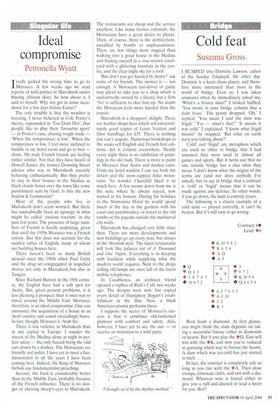Ideal compromise
Petronella Wyatt
really picked the wrong time to go to Morocco. A few weeks ago we read reports of wild parties in Marrakesh under blazing African skies. So how about it, I said to myself. Why not get in some decadence for a few days before Easter?
The only trouble is that the weather is freezing. I never believed in Cole Porter's theory, expounded in 'Too Darn Hot', that people like to play their 'favourite sport' — in Porter's case, chasing rough trade — When the temperature is low'. When the temperature is low, I feel more inclined to huddle in my hotel room and go to bed — alone. My male French friends are feeling rather similar. Not that they have heard of Howell James, the former Downing Street adviser who was in Marrakesh recently behaving enthusiastically. But they prefer to stay in their houses in the Medina as black clouds hover over the town like some punishment sent by God. Is this the new Sodom & Gommorah?
Most of the people who live in Marrakesh don't seem worried. But there has undoubtedly been an upsurge in what might be called 'curious tourism' in the past few years. The presence of large numbers of French is hardly surprising, given that until the 1950s Morocco was a French colony. But this does not account for the sudden influx of English, many of whom are building houses here.
There haven't been so many British around since the 1960s when Paul Getty and the drug set congregated in stupefied droves not only in Marrakesh but also in Tangier.
Since Richard Burton in the 19th century, the English have had a soft spot for Arabs. But, given present problems, it is less pleasing a prospect than it once was to travel around the Middle East, Morocco, therefore, is an ideal compromise. One can announce the acquisition of a house in an Arab country and sound exceedingly brave. In fact, though, Morocco is 'Arab lite'.
There is less violence in Marrakesh than in any capital in Europe. I wander the streets of the Medina alone at night in perfect safety — the only hazard being the odd cart drawn by a donkey. The Moroccans are friendly and polite. I have yet to meet a fundamentalist in all the years I have been coming here. Indeed, the King of Morocco forbids any fundamentalist preaching.
Second, the food is considerably better than in the Middle East, probably because of the French influence. There is no danger of chewing sheep's eyes in Marrakesh. The restaurants are cheap and the service excellent. Like many former colonials, the Moroccans have a great desire to please. Then, of course, there is the architecture, unsullied by bombs or unpleasantness. There are few things more magical than walking into a great house in the Medina and finding oneself in a rose-strewn courtyard with a glittering fountain in the centre, and the clear night sky for a roof.
'But don't you get hassled by Arabs?' ask some of my friends. The answer is — not enough. A Moroccan taxi-driver or guide may plead to take you to a shop which is undoubtedly owned by a friend, but a firm 'No' is sufficient to shut him up. No doubt the Moroccan feels more hassled than the tourist.
Marrakesh is a shoppers' delight. There are leather shops here which sell extraordinarily good copies of Louis Vuitton and Dior handbags for £35. There is nothing you can't acquire. Numerous bookshops in the souks sell English and French first editions. Art is evident everywhere. Nearly every night there is an exhibition of paintings in the old riads. There is more to paint in Morocco than Arabs and donkey carts. From my hotel window I can see both the desert and the snow-capped Atlas mountains. No wonder Churchill liked it so much here. A few rooms down from me is the suite where he always stayed, now named in his honour. During his holidays in the Mamounia Hotel he would spend much of the day in the gardens with his easel and paintbrushes, or travel to the old tombs or the pagoda outside the mediaeval city walls.
Marrakesh has changed very little since then. There are more developments and new buildings go up every year, but always in the Moorish style. The latest restaurants will look like palaces out of A Thousand and One Nights. Everything is in keeping with tradition while supplying what the modern world requires. Next to the shops selling old lamps are ones full of the latest mobile telephones.
In Casablanca, an architect friend opened a replica of Rick's Café two weeks ago. The designs were new, but copied every detail of Humphrey Bogart's establishment in the film. Now, a black American pianist performs there.
I suppose the secret of Morocco's success is that it combines old-fashioned glamour with comfort and safety. Alas, however, I have yet to see the sun — or receive an invitation to a wild party.


































































 Previous page
Previous page